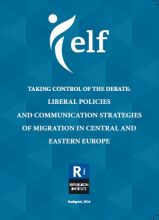In this volume we wish to contribute to ease the tension between those abovementioned two imperatives of liberal policymaking on the field of migration and asylum. In order to achieve it, the volume reviews liberal policy making, consequences of the refugee crisis in electoral politics and various integration models. In the first chapter Marek Bertram compares the reactions of liberal parliamentary parties in Europe to the refugee crisis. The European liberal parties gave different responses to this challenge. It was a deciding factor if the given party was in the government, if the home country was a primary target of migration and if the home country lied on a main migration route. In his contribution Géza Tokár analyses the effects of the refugee crisis on the 2016 Slovak parliamentary elections. The bad results of the governing Smer party proved, that the migration issue alone is not sufficient for electoral success. Immigration implies the need of social integration of the newcomers. As Sándor Szabó points out economic and cultural aspects should be taken into account in this matter. Finally, Andrea Virág and Dániel Mikecz, researchers of Republikon Institute presents a detailed analysis of the 2016 Hungarian referendum on the EU refugee relocation quota.
